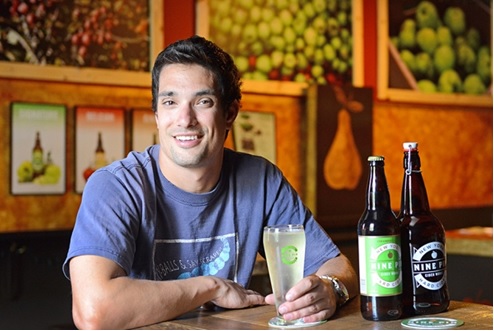Photo by Liz LaJeunesse.
Every cider reveals the choices behind it. Some aim for speed. Some chase sweetness. Ours is built around something simpler—and harder: letting New York apples speak for themselves.
Ask anyone who’s tasted Nine Pin next to something mass-produced and they’ll tell you it just… drinks different. Brighter. Cleaner. More depth from start to finish. There’s a reason for that, and it begins long before fermentation.
It begins in the orchard.
Flavor Begins With the Fruit (All of It)
“If you want great cider,” says Alejandro del Peral, our co-founder and head cider maker, “you have to start with great apples. There’s just no shortcut there.”
In an orchard, not every apple is destined for the grocery store. The most beautiful fruit becomes “Grade A.” The small, the sun-streaked, the hail-kissed—the ones with personality—are often labeled “processing apples.” Historically, growers earned little to nothing from that expressive 10%. Many seasons, those apples never even left the tree.
But here’s the secret: those imperfect apples often have exceptional flavor. Higher acidity. More aromatic punch. More complexity. They’re the unsung heroes of great cider—if someone is willing to value them.
So we do. Our partnership with Samascott Orchards ensures the whole harvest is pressed—not just the flawless apples. When an orchard can rely on every bit of fruit being worth picking, the juice gets richer, more expressive, and more true to the season.
That shows up in every glass.
Whole Apples. Fresh Pressed. Never the Leftovers.
Not all cider starts with the same kind of juice.
Some large producers source juice from the byproducts of industrial pie-slicing—skins, cores, the parts leftover after the “real” fruit is removed. That pressed liquid may be economical, but it isn’t exactly bursting with character. It takes a lot of sugar, flavorings, and post-processing to turn it into something drinkable.
We work the opposite way.
At Nine Pin, our cider begins with whole apples, pressed fresh, grown for eating and drinking—not as scraps. It’s a different starting point entirely.
You can smell it before you sip:
- A vivid, honest apple aroma
- A palate with structure and dimension
- A finish that’s crisp, not cloying
Whole fruit creates whole flavor. There’s no need to fix or cover it.
Intentional Fermentation (a.k.a., Our Favorite Kind of “Inefficiency”)
“We’re much less efficient than other cideries our size,” Alejandro admits, with a dry grin. “But that’s kind of the point.”
Cider is transparent. It reflects your decisions—and your shortcuts. We choose intention over acceleration:
- Fermentations are guided by the kind of nuance we want in the final cider.
- Yeasts are selected for how they amplify the fruit, not how fast they finish.
- Blending happens by palate, not by production schedule.
- Small batches allow small adjustments that change the entire profile.
This isn’t the romantic version of craft. It’s the real one. And it leads to ciders that stay interesting from the first sip to the warm last sip in the glass.
The Urban Cidery Advantage You Can Taste
Nine Pin didn’t begin with the polished space you see today. It began with one tank, some floor drains, and Alejandro and his dad doing quick-and-dirty renovations just to make the room ferment-ready.
Then the Farm Cidery license changed everything. Suddenly, the cidery designed for production became the cidery designed for both production and immediate feedback. Being in Albany turned into an unexpected creative advantage:
- New ideas can be prototyped fast.
- Drinkers taste what the production team tastes.
- The blending process responds to real palates, not theoretical ones.
Innovation isn’t isolated—it’s part of the daily rhythm.
What You Taste When You Drink Nine Pin
We could talk all day about apple grades, fermentation kinetics, or orchard economics. But at the end of the day, here’s what matters most:
Nine Pin tastes like real apples. Not “apple flavor.”
It has lift, structure, and balance—not just sweetness.
It carries the character of New York orchards—not the sameness of industrial juice.
This is cider built from raw materials and a process designed around flavor, not convenience. It’s crafted with respect for the fruit, the farm, and the drinker.
As Alejandro says, “We’ve always done it this way—not because it’s easier, but because it’s better. And you can taste better.”
That’s the truth inside every can, bottle, and pour of Nine Pin: a cider that reflects where it’s from and why it matters.
